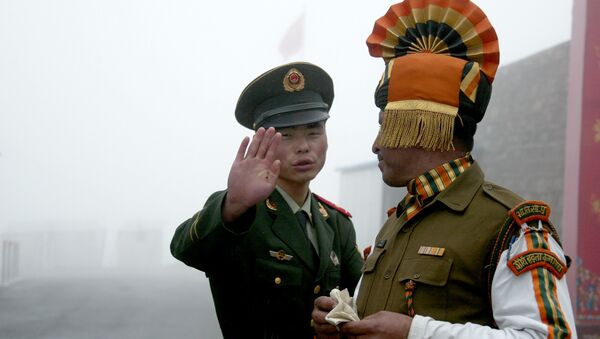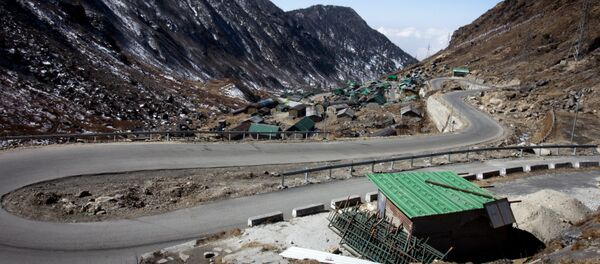His words, which were addressed to Ashok Mehta, a former Major General of the Indian Army, reflect the escalating border conflict between Beijing and New Delhi in the region known as "Doklam" in India and "Donglang" in China.
Answering the Indian colleague's words that the Doklam area remains disputed territory, Zhou Bo said that "Bhutan participated in 24 rounds of talks and never questioned that this was an essential part of China."
Chinese President Xi Jinping, for his part, stressed that although Beijing always stands for peace and dialogue, it will not allow anyone to take away even a small plot of Chinese territory.
China & India Locked in 'Eye-to-Eye' Border Standoff#tcot #pjnet #God #Jesus #ccot #Bible #Prophecy #Pray #Israelhttps://t.co/7MbkXoWuul pic.twitter.com/7ZpdvbogpV
— Prophecy Depot (@ProphecyDepot) 25 июля 2017 г.
In early June, Chinese workers began to build a highway through the Doklam plateau, which triggered a protest from Bhutan. A few days later, Indian servicemen, with whom Bhutan had friendly relations, crossed the state border and after a short skirmish drove the Chinese military from the area.
CGTN, in turn, claimed that "the China-India border dispute broke out when Indian border troops illegally crossed the Sikkim sector of the China-India boundary and entered Chinese territory on June 18."
#China: #India must pull back its #troops amid border standoffhttps://t.co/LbGSGbX3Hq#Tibet pic.twitter.com/mDWdqkiiRr
— Taiwan News (@TaiwanNews886) 24 июля 2017 г.
Commenting on the issue in an interview with Sputnik, Russian military expert Vasily Kashin said that the Chinese-Indian border standoff "came at the most unfavorable time, especially from the point of view of Beijing."
Citing the upcoming 19th Congress of the Communist Party of China and a BRICS summit due to be held in China's Xiamen, Kashin said that "the Chinese leaders now cannot afford to look weak", which is why they made a spate of stern statements on the matter.
#VoA China: India Must Pull Back its Troops Amid Border Standoff https://t.co/NVZCURPbjK #Pakistan
— Eʏᴇ ᴏɴ Pᴀᴋɪsᴛᴀɴ (@Eye_on_Pakistan) 24 июля 2017 г.
"Given the political situation in China, one can hardly assume that Beijing deliberately provoked the current aggravation of the situation. Perhaps Beijing thought that by dealing with the construction in the disputed area, it did nothing illegal. On the other hand, the Indian side could see Chinese actions as offensive and aggressive," Kashin added.
He recalled that "India is concerned about China's growing South Asian clout" and that "Bhutan has special relations with India which stipulate India being responsible for Bhutan's security and foreign relations." Additionally, New Delhi is alarmed about the growth of economic and military and technical cooperation between China, Bangladesh and Sri Lanka, according to Kashin.
"Further intensification of competition is out of line with the parties' interests. China, with all its attempts to expand its influence in South Asia, cannot afford to alienate India by sending it toward a closer partnership with the US in the security sphere," Kashin said.
He warned that "if an irreversible deterioration in relations occurs, China will complicate India's strategic position thanks to a more powerful army and a military and industrial complex as well as control over Tibet."
He also drew attention to the fact that "a number of third-party players are now interested in escalating the current border disputes between India and China." In this vein, he recalled that on July 16, false news about a Chinese missile attack on an Indian border checkpoint post was published in the Pakistani media and social networks.
"In the current situation, it would be extremely important for India and China to reach a compromise on the issue. A stiff struggle for influence on minor regional countries does not meet the interests of either side. Such a struggle would hurt increasingly important Sino-Indian economic ties and may eventually turn into a military confrontation," Kashin concluded.



